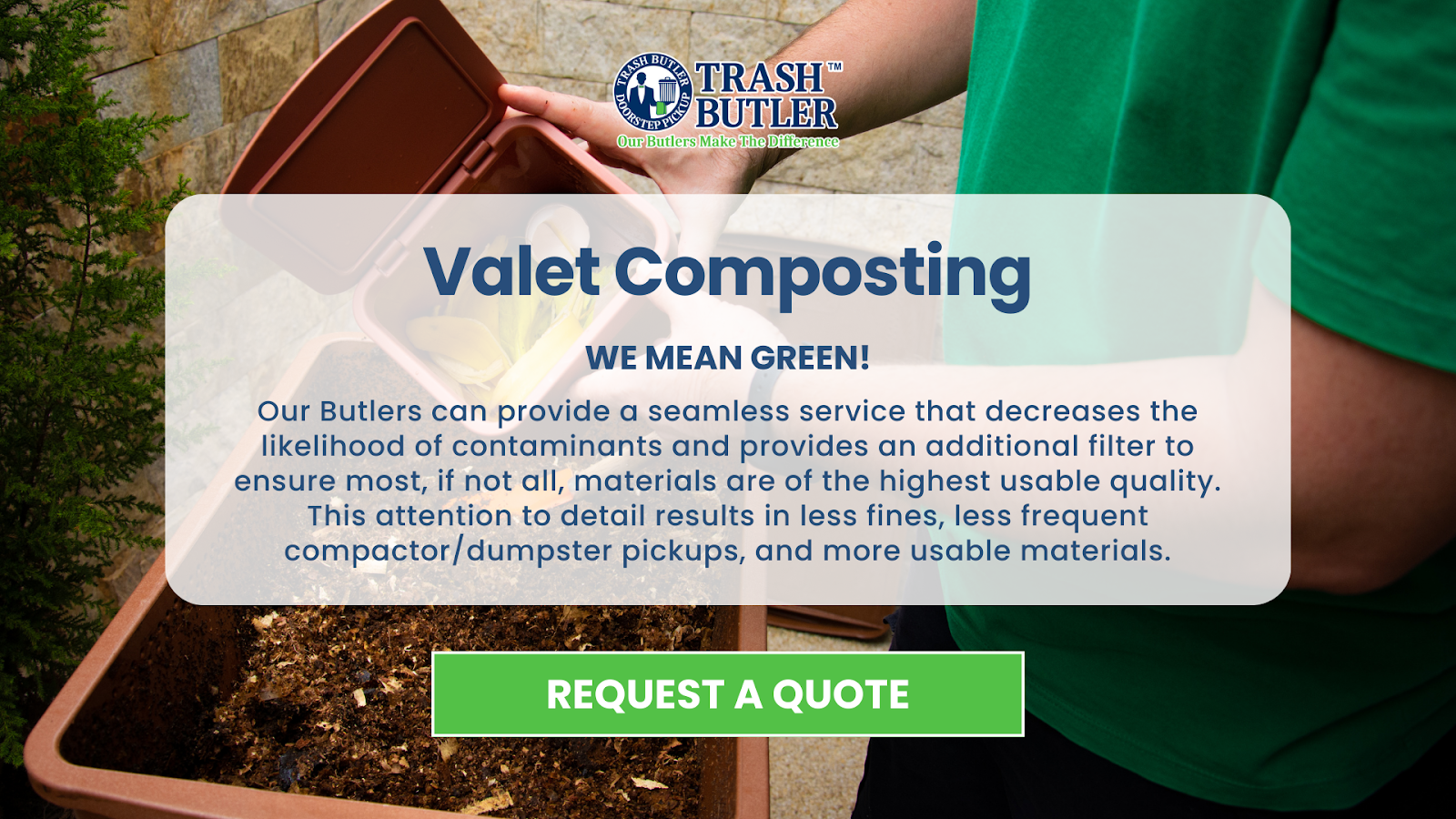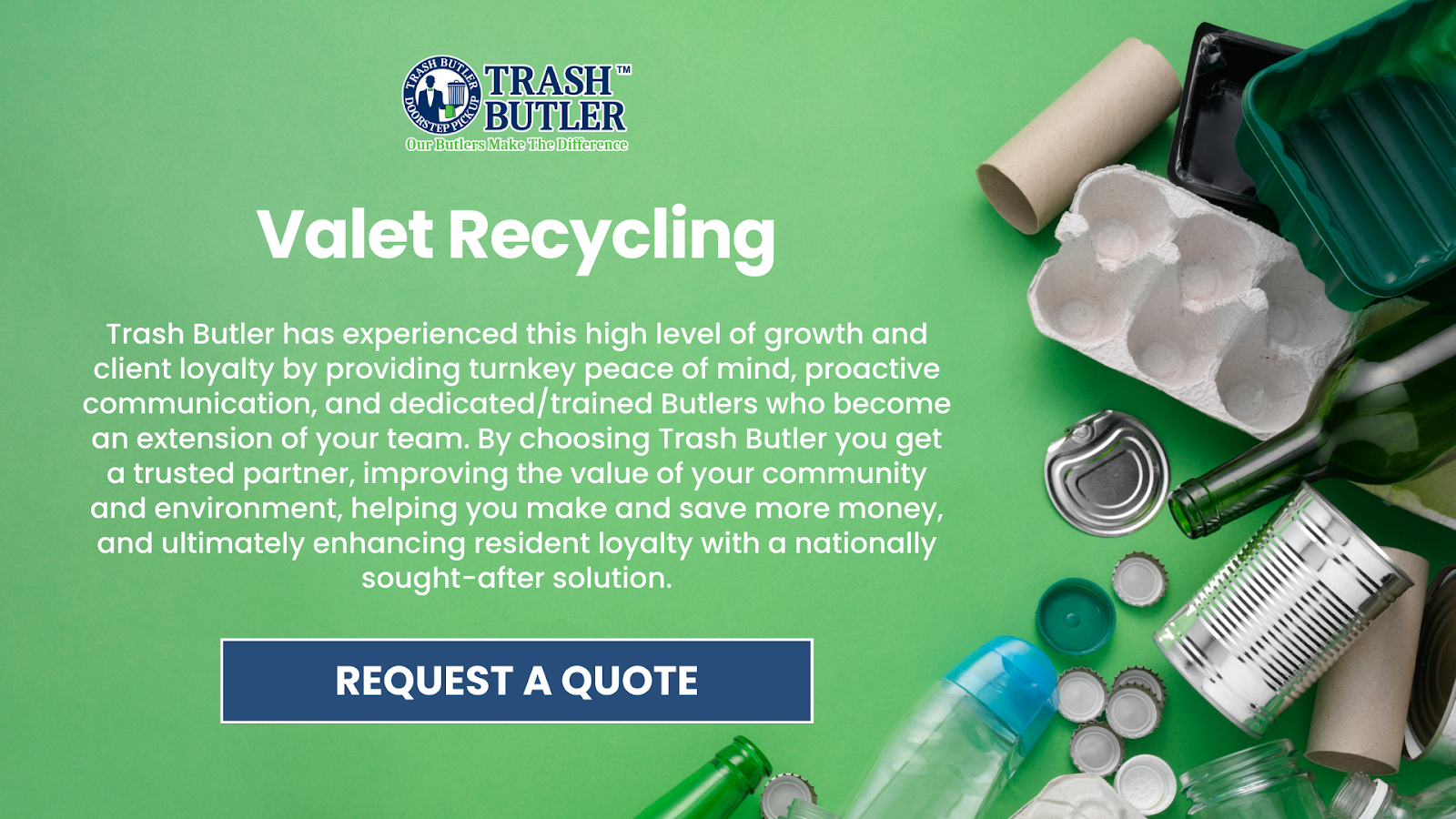Key Takeaways:
- Eco-Friendly Waste Solutions Increase Resident Satisfaction: Implementing green waste practices like recycling and composting boosts tenant loyalty and attracts environmentally conscious renters.
- Waste Audits Optimize Cost Savings: Regular audits identify areas for improvement, reduce landfill contributions, and lower waste disposal costs through better sorting and reduced pickup frequency.
- Engage Residents With Incentives: Reward systems, community events, and feedback mechanisms can significantly improve participation in sustainable waste programs, driving both environmental and financial benefits.
Is it possible to go green without going broke? For multifamily property managers, balancing eco-friendliness with cost-effectiveness feels like a tightrope. On one side is the growing demand for sustainable practices from eco-conscious tenants. On the other hand, there’s pressure to keep operational expenses under control. It’s a delicate balancing act; one misstep can mean lost profits or dissatisfied residents.
In this article, we’ll explore strategies to effectively balance eco-friendliness and cost when managing waste in multifamily properties. Whether you’re looking to implement recycling programs, reduce landfill contributions, or simply optimize your current system, we’ve got actionable insights to guide you.
Why Eco-Friendly Waste Solutions Matter For Apartments
In today’s progressively eco-conscious society, integrating eco-friendly waste solutions for apartments is not just a trend but a necessity. Multi-family apartment communities have a powerful role in driving sustainable living practices. Here’s why adopting eco-friendly waste solutions is crucial for apartment complexes:
Enhancing Resident Satisfaction
Eco-friendly practices often result in increased resident satisfaction and loyalty. Tenants are increasingly favoring communities that offer sustainable waste management systems. Recycling programs and responsible waste disposal help reduce the collective environmental footprint and reflect positively on the apartment’s commitment to sustainability.
Compliance With Regulations
Municipal regulations regarding waste management and sustainability are becoming more stringent. Implementing eco-friendly waste solutions helps apartment communities comply with local and federal regulations. This proactive approach mitigates potential fines and legal issues and positions the property as a forward-thinking entity.
Cost Efficiency In The Long Run
While the initial costs of implementing sustainable waste management systems appear high, they can lead to significant savings over time. Reducing waste disposal frequency and promoting recycling minimize landfill contributions and eventually decrease the costs associated with waste management. Additionally, efficiency gains can be achieved through technology-driven solutions such as smart bins and waste sorting systems.
Positive Branding And Marketability
Eco-friendly initiatives can enhance the property’s brand image and appeal to environmentally aware tenants. An apartment complex can differentiate itself in a competitive rental market by positioning itself as a green community. This unique selling proposition attracts potential renters and retains existing ones who value sustainable living environments.
The Challenge: Balancing Sustainability And Cost In Apartment Buildings
Implementing eco-friendly waste solutions in apartment buildings presents a unique set of challenges. Property managers must navigate the delicate balance between environmental responsibility and the financial realities of operating a successful business.
Initial Investment Costs
Implementing sustainable solutions often requires upfront investments. This can include purchasing recycling bins, installing composting systems, or upgrading to more energy-efficient waste compactors. These initial costs can be a significant hurdle for some property owners.
Ongoing Operational Costs
Eco-friendly waste disposal methods, such as composting and recycling, can sometimes incur higher costs than traditional landfill disposal. Property managers may need to negotiate new contracts with waste haulers or explore alternative disposal options, which can impact the bottom line. Maintaining and repairing eco-friendly equipment, such as composting systems or recycling centers, can incur ongoing costs.
Resident Education And Engagement
Encouraging resident participation in recycling and composting programs requires ongoing education and outreach efforts. This can include distributing informational materials, organizing resident workshops, and implementing incentive programs. These initiatives require time, resources, and ongoing effort.
Addressing Contamination Issues
Contamination of recycling streams can significantly increase processing costs and render recyclables unusable. Educating residents about proper recycling practices and implementing effective sorting systems requires ongoing effort and can be challenging to enforce.
Balancing Resident Expectations
Residents have varying expectations regarding sustainability. While some may enthusiastically embrace eco-friendly initiatives, others may resist changes that impact their daily routines or increase their responsibilities. Property managers must carefully consider resident feedback and address concerns to ensure program success.
Eco-Friendly Waste Solutions Apartments: More Than Just-Recycling Bins
Recycling bins are often considered when eco-friendly waste solutions are discussed in multi-family apartments. However, sustainable waste management goes far beyond separating paper from plastic. For apartment communities, the real challenge is developing an environmentally friendly and cost-effective comprehensive waste strategy.
Composting: A Valuable Tool
Composting is an often-overlooked solution that can divert organic waste like food scraps and yard trimmings from landfills. Offering compost bins in common areas and providing pickup services can reduce waste and save money on waste disposal in the long run. Additionally, the compost can be used for landscaping, cutting maintenance costs.
Waste Diversion Programs
A true waste diversion program requires more than a recycling bin. Apartment communities can implement multi-stream sorting for recyclables, compostables, and waste. Specialized collection systems for electronics and bulky items can further reduce landfill contributions. While this requires investment, the long-term savings in waste hauling and landfill fees are substantial.
Waste Compaction And Energy-Efficient Solutions
Installing waste compactors or using solar-powered bins helps reduce waste volume, pickup frequency, and transportation costs. These energy-efficient systems may have higher initial costs but lead to significant long-term savings.
Sustainable Waste Management Partnerships
Partnering with waste management providers who specialize in sustainability can help optimize waste solutions. These providers bring expertise, ensuring the property uses the most cost-effective and eco-friendly systems. They can also monitor performance and suggest improvements, leading to further savings and better waste diversion.
Reducing Waste In Apartments: Strategies That Save Money And The Planet
Navigating the dual objectives of cost efficiency and sustainability is a critical challenge in modern multi-family apartment management. Employing innovative, eco-friendly waste solutions in apartments can significantly reduce waste, providing financial and environmental benefits. Here are some strategic insights:
Implement A Comprehensive Recycling Program
Initiating a robust recycling program is a fundamental step toward lowering a property’s overall waste disposal costs while promoting sustainability. Clearly labeling recycling bins and offering guidance on separating recyclables can streamline the process for residents. By encouraging participation through incentives or informative workshops, communities can improve recycling rates and reduce the volume of landfill-bound waste.
Opt For Valet Trash And Recycling Services
Engaging services like Trash Butler™ can enhance resident conveniences and waste management efficiencies. With specialized valet trash and recycling services, apartments can seamlessly integrate waste collection while ensuring recyclables are properly sorted. This approach not only upholds high standards of cleanliness and order but also maximizes recycling success, contributing to cost reductions associated with waste processing.
Introduce Composting Options
Adding composting options can substantially diminish the waste generated in apartment complexes. By providing residents with the resources and knowledge needed to compost organic waste, property managers can further reduce landfill contributions. Composting also enriches the soil if apartments have garden spaces, promoting a self-sustaining approach to landscape maintenance.
Conduct Waste Audits
Regular waste audits can identify areas where waste reduction initiatives are most needed and impactful. By analyzing the types of waste generated, managers can pinpoint specific materials to target with recycling or reduction programs. This data-driven approach helps tailor solutions to the unique taste profiles of each apartment community, ensuring optimized waste management strategies and minimized disposal costs.
Waste Audits: A Key Step Towards Sustainable Apartment Waste Management
A waste audit is essential for apartment communities aiming to balance sustainability with cost efficiency. This process involves analyzing waste to identify areas for improvement and optimize waste management strategies. Beyond recycling bins, a waste audit helps uncover opportunities to reduce waste, lower costs, and improve eco-friendly practices.
Identifying Waste Streams
A waste audit categorizes waste, identifying recyclables, compostables, and general waste. This helps create effective waste diversion programs, like composting for organic materials or setting up multi-stream sorting systems to separate recyclables. It also reveals opportunities for improved waste management strategies.
Pinpointing Areas For Improvement
Audits highlight problem areas, such as contamination in recycling bins or low participation in composting. Identifying these challenges allows managers to implement targeted solutions, like better signage, education, or more convenient disposal options.
Calculating Cost Savings
Property managers can optimize collection schedules, reduce pickup frequency, and decrease landfill fees by analyzing waste streams. Waste diversion can generate revenue through recyclables, contributing to long-term cost savings.
Enhancing Sustainability Practices
A waste audit improves sustainability by revealing gaps in current programs. It provides data for better recycling and composting practices, ensuring the community reduces its carbon footprint and environmental impact.
Ongoing Monitoring
Waste audits should be periodic to track progress and adjust strategies. Regular reviews help improve the waste diversion program and ensure continued cost savings and environmental benefits.
Resident Engagement
Audits help gauge resident participation in waste management efforts. If engagement is low, audits provide insight into needed changes, such as better education or more accessible waste disposal options.
Incentivizing Resident Participation: Eco-Friendly Programs That Work
Engaging residents in eco-friendly waste solutions for apartments is crucial in balancing sustainability and cost-effectiveness. While many residents are keen on supporting green initiatives, providing incentives can significantly boost participation rates, enhancing the effectiveness of any waste management program. Below are some strategies that have proven successful in encouraging resident involvement:
Reward Systems
A reward system can transform residents’ recycling habits by offering tangible benefits. For example, points can be awarded for each pound of recycling collected, which can then be redeemed for discounts on rent or access to premium apartment amenities. This encourages more residents to participate and consistently reinforces the importance of sustainable behaviors.
Community Engagement Events
Organizing community events focused on sustainability can also foster a culture of environmental consciousness. Workshops on recycling best practices, informative sessions on the benefits of sustainable living, and hands-on activities such as community clean-ups create an interactive platform for residents to learn and engage. Moreover, these events serve as a valuable opportunity for community building and demonstrating the apartment community’s commitment to eco-friendly principles.
Feedback Mechanisms
Establishing clear and direct lines of communication where residents can express their suggestions or concerns helps tailor eco-friendly programs to meet community needs better. Regular surveys or feedback forms can guide property managers in refining waste management strategies that align with resident expectations, ultimately leading to higher satisfaction and program efficiency.
Choosing The Right Waste Hauler: Eco-Conscious Options For Apartments
Eco-conscious waste haulers offer services that minimize environmental impact while ensuring cost-effectiveness, aligning with broader sustainability goals. Here are some considerations to keep in mind when choosing an eco-friendly waste solution for your apartments:
- Evaluate Their Recycling Programs: An ideal waste hauler should have robust recycling programs that support waste separation at the source. Confirm that the hauler can recycle various materials and reduce landfill contributions.
- Assess Their Technology and Equipment: Advanced waste haulers utilize innovative technology to streamline waste collection and separation processes. Look for providers that employ energy-efficient vehicles and offer smart waste management solutions, such as sensor-equipped bins that optimize collection efficiency.
- Scrutinize Their Sustainability Practices: A truly eco-friendly waste hauler will adhere to strict environmental standards. Investigate their sustainable practices, including reducing carbon emissions and waste diversion targets, to ensure they align with your community’s sustainability objectives.
- Examine Cost Structures and Incentives: Balancing budgetary constraints with eco-friendly solutions requires cost transparency. Seek waste haulers that provide competitive pricing without compromising on environmental commitments, and inquire about potential incentives for communities that adopt sustainable practices, such as discounts for high recycling rates or reduced service footprints.
- Understand Their Educational Initiatives: Effective waste management requires informed participation from residents. Opt for haulers that offer educational resources and community engagement programs to increase awareness and compliance with eco-friendly waste practices within your property.
Final Thoughts
Balancing sustainability with cost-efficiency in multifamily waste management is possible and essential for the environment and the bottom line. By embracing eco-friendly waste solutions such as recycling programs, composting, and waste audits, property managers can drive significant long-term savings while enhancing resident satisfaction.
The key to success lies in a strategic approach—engaging residents, optimizing waste systems, and leveraging eco-conscious partnerships. It’s about creating a sustainable future for the property while ensuring it remains financially viable.
At Trash Butler™, we understand the unique challenges multifamily communities face and have refined our services to meet these needs efficiently. Our commitment to sustainability and exceptional customer service ensures we deliver value beyond waste management.
Request a Quote: Fill out a form to see how Trash Butler™ can benefit your community.
Additional Reading:
- The Importance Of Valet Recycling For Eco-Friendly Apartment Complexes
- Reducing Property Liability With Professional Valet Trash Services
- The Top 5 Benefits Of Offering Valet Trash Services To Residents
Frequently Asked Questions About Balancing Eco-Friendliness And Cost In Multifamily Waste Solutions
Is it more cost-effective to invest in waste reduction or disposal?
Investing in waste reduction is generally more cost-effective in the long term. By minimizing waste generation, properties can reduce hauling and disposal expenses. Implementing recycling programs and encouraging reusable items can save significant costs and lessen environmental impact.
How can landlords encourage tenants to participate in sustainable waste practices?
Landlords can encourage tenant participation by providing convenient recycling options and clear guidelines on waste segregation. Organizing educational workshops and offering incentives for consistent recycling can bolster tenant engagement. Regular communication and reminders about the benefits of eco-friendly practices can also foster a culture of sustainability.
What are the cost implications of not recycling in multifamily properties?
Not recycling can result in higher disposal costs due to increased waste volume. Additionally, failing to recycle may lead to missed opportunities for cost recovery through selling recyclable materials. Non-compliance with local regulations requiring recycling can result in fines, further increasing operational costs for properties.
How can technology help in managing waste in multifamily buildings?
Technology, such as smart waste monitoring systems, can optimize waste collection by providing data on waste generation patterns. This insight allows for tailored waste management strategies that reduce costs and improve efficiency. Additionally, technology can automate processes, alerting management when waste levels reach thresholds that necessitate action.
Can a zero-waste goal be financially viable for multifamily communities?
Pursuing a zero-waste goal can be financially viable if approached strategically. While initial investments may be necessary for infrastructure and education, the long-term savings from reduced disposal fees and potential revenue from recyclables can offset these costs. Engaging stakeholders and leveraging partnerships are also crucial for financial viability.
How do waste management costs compare for different sizes of multifamily properties?
Waste management costs can vary widely based on property size. Larger properties may benefit from economies of scale, allowing for reduced per-unit costs in waste collection and disposal. However, they may also face higher initial investments in infrastructure and recycling programs. Conversely, smaller properties might have lower initial costs but pay more per unit for waste services. Understanding these dynamics is essential for tailored and cost-effective waste management solutions.






